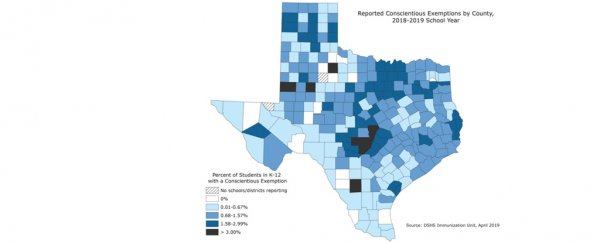A Texas state legislator unleashed a vilifying attack on a leading vaccine scientist Tuesday, accusing the doctor of "sorcery".
It started with a report published Monday by the Texas Department of State Health Services that noted the state recorded a 14 percent rise in parents opting out of their children's vaccinations.
It was a new statistic that alarmed Peter Hotez, professor and dean of the National School of Tropical Medicine at Baylor College of Medicine.
"We have more than 64,000 kids not getting vaccinated in the state of Texas, and that doesn't account for the over 300,000 home-schooled kids," Hotez said during an interview with The Washington Post.
Hotez took his concerns about the report to Twitter. And then he received an unexpected, seething personal attack from the Republican state legislator, Rep. Jonathan Stickland.
New school #vaccine exemption numbers reported yesterday by @TexasDSHS. Now >64,000 kids not vaccinated, with #Austin schools, which can no longer be considered safe for kids. All to benefit outside #antivax groups from CA NY DC monetizing the internet. Where is our leadership? pic.twitter.com/x92gIZT3m9
— Prof Peter Hotez MD PhD (@PeterHotez) May 7, 2019
"You are bought and paid for by the biggest special interest in politics," Stickland wrote. "Do our state a favor and mind your own business. Parental rights mean more to us than your self enriching 'science'.
In a tweeted response, Hotez, a pediatrician and vaccine scientist, noted to Stickland that he does not receive money from the vaccine industry; instead, his work focuses on "neglected disease vaccines for the world's poorest people."
Stickland, who told The Post he is "not anti-vaccination," tweeted his response to Hotez.
"Make the case for your sorcery to consumers on your own dime," the Republican, who represents an area of suburban Fort Worth, snapped back Tuesday. "Quit using the heavy hand of government to make your business profitable through mandates and immunity."
(Hotez is not part of a for-profit business, either as a dean at the Baylor College of Medicine or as an endowed chair at the nonprofit Texas Children's Hospital.)
Although Stickland backs "parental rights," he is not discouraging vaccination, he told The Post on Wednesday. In fact, he said, "parents should take that responsibility seriously".
"It comes down to whether the government should be mandating what's right for us," Strickland said. "I side with the individual."
Wow that's impressive, from a member of the Texas House of Representatives. Sir, as you know, I don't take a dime from the vaccine industry. I develop neglected disease vaccines for the world's poorest people. And as a Texas pediatrician-scientist it is most certainly my business https://t.co/xcEWxYhC8t
— Prof Peter Hotez MD PhD (@PeterHotez) May 7, 2019
As The Post previously reported, parents in 17 states can opt out of vaccinating their children for personal or philosophical objections.
All states have medical exemption laws, since some people with health issues cannot be vaccinated, and nearly all states grant religious exemptions.
The anti-vaccination movement has grown from a fringe group to a dominant force nationwide, launching political action committees in several states, including Texas, lobbying state legislatures to disarm the vaccination infrastructure.
From January 1 through April 26, 704 cases of measles were reported, the highest number of cases reported since 1994. Outbreaks in close-knit communities accounted for 88 percent of all cases.
Of 44 cases directly imported from other countries, 34 were US residents traveling internationally; most were not vaccinated.
Across the United States, more than 760 measles cases have been reported to the Centers for Disease Control and Prevention in 2019, the highest number of cases since 1994, according to the CDC. Fifteen of those cases came from Texas, Hotez said.
Hotez called the fast-spreading disease a "dangerous situation" for "cities like Austin and Plano."
"You have schools that are not safe for kids because so many kids are not getting vaccinated," Hotez said.
2019 © The Washington Post
This article was originally published by The Washington Post.
